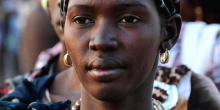Fear, shame, women and the law
In 100 countries worldwide, women are barred from doing certain work solely because they are women. Over 150 countries have laws that are discriminatory to women, and only 18 countries are free of such laws. In 32 countries, women cannot apply for passports in the same way as men.















